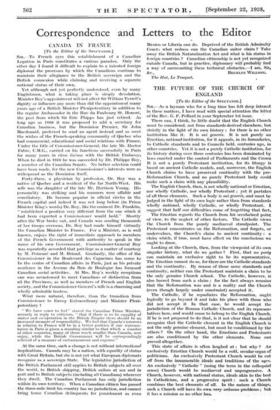Correspondence and Letters to the Editor CANADA IN FRANCE [To
the Editor of the SPECTATOR.] SIR,—To French eyes this establishment of a Canadian Legation in Paris constitutes a curious paradox. Only the other day I found it difficult to explain to a talented foreign
diplomat the processes by which the Canadians continue to maintain their allegiance to the British sovereign and the British connexion while claiming and receiving a separate national status of their own.
Yet although not yet perfectly understood, even by many Englishmen, what is taking place is simply devolution. Minister Roy's appointment will not affect Sir William Isprell's
dignity or influence any more than did the appointment many years ago of a British Minister Plenipotentiary in addition to the regular Ambassador in the Rue du Faubourg St. Honore; the post from which Sir Eric Phipps has just retired. As long ago as 1888 it was proposed to add a secretary for Canadian business, but the Dominion Premier, Sir John Macdonald, preferred to send an agent instead and so meet the wishes of the French-speaking community of Quebec who had commercial, educational and social relations with France. Under the title of Commissioner-General, the late Mr. Hector Fabre, C.M.G., carried on his functions successfully in Paris for many years in close liaison with the British Embassy.
When he died in 1910 he was succeeded by Dr. Philippe Roy, a member of the Canadian Senate. No better selection could have been made, for the new Commissioner's interests were as widespread as the Dominion itself.
Forty-three, a physician by profession, Dr. Roy was a native of Quebec and a resident of the far North-West. His wife was the daughter of the late Mr. Harrison Young. His personality was striking and his manners were affable and conciliatory. He became popular in official circles in the French capital and indeed it was not long before (in Prime.
Minister King's words) Dr. Roy, like the eminent Dr. Franklin, "established a position very different from the one which it
had been expected a Commissioner would hold." Shortly after the War broke out, and Canada was sending thousands of her troops overseas, Dr. Roy had made himself virtually
the Canadian Minister to France. For a Minister, as is well known, enjoys the right of immediate approach to members of the French Government with authority to speak in the name of his own Government. Commissioner-General Roy was repeatedly accorded that privilege as a matter of courtesy by M. Poincaré and M. Briand. Gradually, the office of the Commissioner in the Boulevard des Capucines has come to be the centre of Canadian affairs in Paris, just as his private residence in the Avenue du Bois de Boulogne has focussed Canadian social activities. At Mrs. Roy's weekly receptions one was accustomed to meet Canadians of distinction from all the Provinces, as well as members of French and English society, and the Commissioner-General's wife is a charming and wholly admirable hostess.
What more natural, therefore, than the transition from Commissioner to Envoy Extraordinary and Minister Pleni- potentiary?
"We have come to feel" stated the Canadian Prime Minister, recently in reply to criticism "that if there is to be equality of status and co-operation in the British Empire there should be an increased measure of responsibility. We feel that Canada's interests in relation to France will be in a better position if our represen- tative in Paris is given a standing similar to that which a number of other countries, many of them much smaller than Canada, now enjoy, while the British Government will be correspondingly relieved of a measure of embarrassment and expense."
At the same time, such a change is not without international implications. Canada may be a nation, with equality of status with Great Britain, but she is not yet what European diplomats recognize as a sovereign State. The legislative jurisdiction of
the British Parliament still applies to British subjects all over the world, to British shipping, British sailors at sea and in port and to British subjects (including all Canadians) wherever they dwell. The Canadian Parliament has only jurisdiction within its own territory. When a Canadian citizen has passed the three-mile limit his country has no jurisdiction, and cannot bring home Canadian delinquents for punishment as even Mexico or Liberia can do. Deprived of the British Admiralty Courti what redress can the Canadian suitor claim ? Take away the British Naturalization Act and what is his status in foreign countries ? Canadian citizenship is not yet recognized outside Canada, but in practice, diplomacy will probably find a way of surmounting these technical obstacles.—! am, Sir;






































 Previous page
Previous page